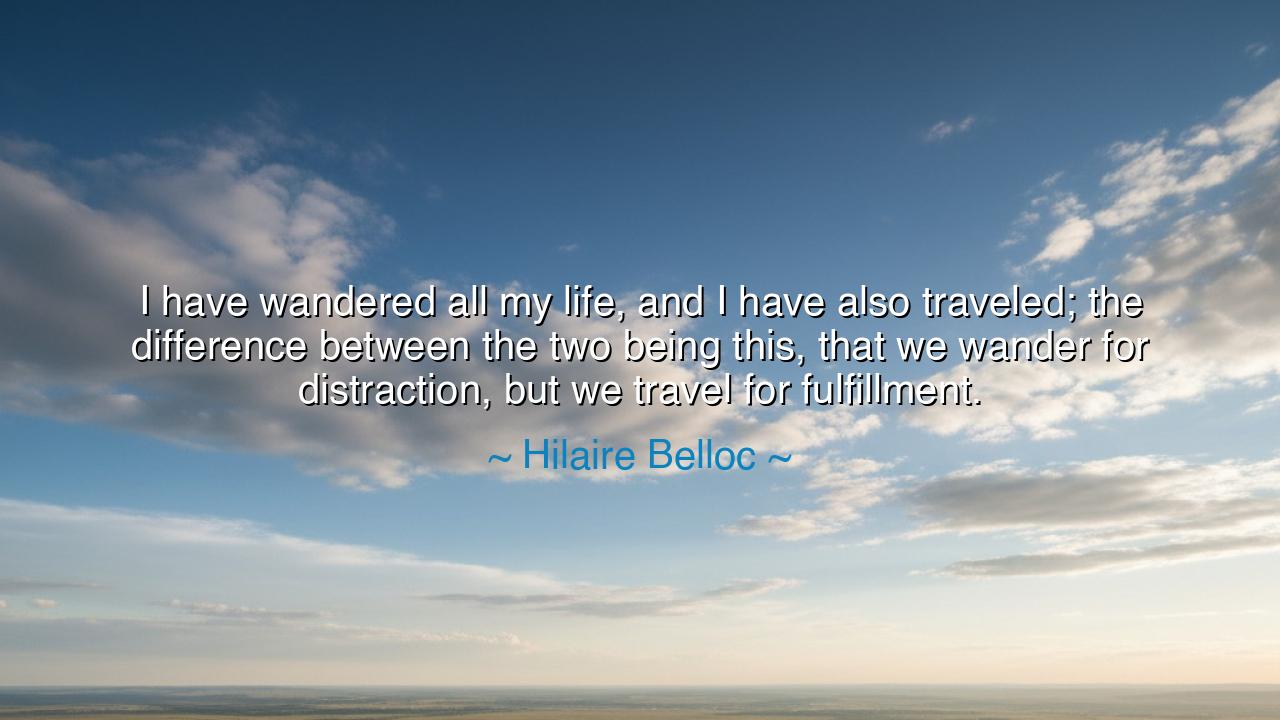
I have wandered all my life, and I have also traveled; the
I have wandered all my life, and I have also traveled; the difference between the two being this, that we wander for distraction, but we travel for fulfillment.






The writer and pilgrim Hilaire Belloc once spoke with the voice of one who had known both longing and rest: “I have wandered all my life, and I have also traveled; the difference between the two being this, that we wander for distraction, but we travel for fulfillment.” At first hearing, his words sound gentle, almost reflective, yet they carry the weight of an ancient truth. For in them lies the distinction between the restless drifting of the soul and the purposeful journey of the spirit. To wander is to escape; to travel is to seek.
To wander for distraction is the mark of a heart unsettled, of one who flees not to find but to forget. Such a wanderer moves without direction, hoping the roads themselves will bury sorrow, or that the changing landscapes will silence the inward cry. The ancients knew this kind well—the exile, the outcast, the soldier returning with no home to receive him. Wandering has its beauty, but it is a beauty tinged with loss, for it springs not from fullness but from emptiness.
By contrast, to travel for fulfillment is to embark upon the sacred journey with purpose, to leave home not to escape but to grow. It is the voyage of the pilgrim, the seeker of wisdom, the student of the world who knows that every step toward the horizon is also a step inward. The pilgrim journeys to Mecca, to Compostela, to the Ganges—not to distract himself, but to find truth, to knit his spirit into something larger than his solitary self. In travel, the heart is not fleeing; it is advancing toward its destiny.
History gives us luminous examples. Think of Odysseus, whose wandering after the fall of Troy brought him torment upon torment. He drifted for distraction, blown by the winds of fate, yearning always to return home but endlessly delayed. His wandering was suffering. Yet contrast him with Marco Polo, who traveled into Asia with intention and wonder. He did not drift for distraction, but sought knowledge, connection, and fulfillment. One’s journey left him weary; the other’s left him enriched, with wisdom carried across the centuries.
Belloc himself, a man of deep Catholic faith, was no stranger to both states. He wandered the roads of Europe, sometimes in poverty, sometimes in song, and yet he also traveled with a pilgrim’s heart—walking from France to Rome, seeking not mere distraction but communion with the eternal. His words come not from theory but from experience, the wisdom of one who had felt both the emptiness of wandering and the fullness of traveling.
The lesson for us is clear: examine your steps. Ask yourself—do I wander, or do I travel? Am I moving to forget, or am I moving to grow? It is no shame to wander, for it is part of the human condition, but let not your life become a restless drifting from distraction to distraction. At some point, choose the deeper way: travel with intention, seek fulfillment rather than escape.
Practical actions follow naturally. Before setting forth, ask why you go. Do not merely run from sorrow or monotony, but set your heart on learning, on encountering beauty, on seeking truth. Read of the places you will walk, honor the cultures you will meet, prepare your soul to receive their gifts. Even in small journeys—a walk through a forest, a day in a nearby town—you can travel instead of wander, if you go with open eyes and a seeking heart.
Thus the teaching of Belloc becomes timeless: “We wander for distraction, but we travel for fulfillment.” To future generations, let this be the measure of their journeys: let them not flee endlessly from themselves, but walk steadily toward the truths that make them whole. For life itself is the great journey, and only those who travel with intention find the fulfillment they were born to seek.






AAdministratorAdministrator
Welcome, honored guests. Please leave a comment, we will respond soon